- Home
- Stephen Hunter
Pale Horse Coming es-2
Pale Horse Coming es-2 Read online
Pale Horse Coming
( Earl Swagger - 2 )
Stephen Hunter
Earl Swagger, the gritty WWII-vet hero of Hunter's bestselling thriller Hot Springs, is back in this virtually un-put-downable gothic chiller about unspeakable evil in the murky Mississippi bayous. In 1951, five years after the conclusion of Hot Springs, straight arrow ex-county prosecutor Sam Vincent tells Earl — his trusted friend and former investigator, now a sergeant in the Arkansas state police — that he has been hired by a Chicago attorney to travel to Thebes, a mythic prison camp in the remote backwaters of Mississippi to verify the death of a black man who is the beneficiary of a will left by a one-time employer. When Earl hasn't heard from Sam by an agreed upon date, he goes looking for him and discovers that he is being held in the prison. Earl frees Sam, but is taken prisoner himself. Tortured by the prison hierarchy who fear he has been sent by a federal agency to expose their abominable secrets, Earl, aided by a trusty, escapes, vowing to return to destroy the camp and kill its evil warden and his henchmen. A staunch upholder of the law, self-righteous Sam refuses to participate in Earl's plan for retribution, but promises not to interfere. Assembling a strike force of seven of the country's most able gunmen, Earl sets out to wipe Thebes from the face of the earth. Meanwhile, probing the fate of a famous doctor who worked for the military researching biological warfare during WWII, Sam realizes Thebes may harbor an even darker secret after a bomb attempt on his life. Unforgettable characters in vivid settings more than offset the melodramatic, credibility stretching scenarios of the hard-driving thriller. Once again, Hunter proves he is a master of the cinematic prose.
Stephen Hunter
Pale Horse Coming
Pale Horse Coming
In mid-1947, Jefferson Barnes, the prosecuting attorney of Polk County, Arkansas, finally died. Upon that tragedy the old man fell out of one of those new golf cart things on vacation in Hot Springs, rolled down a gully screaming damnation and hellfire all the way, and broke his neck on a culvert Sam Vincent, his loyal Number 2, moved up to the big job.
Then in '48, Sam was anointed by the Democratic party (there was no other in western Arkansas), which ran him on the same ticket with Harry S. Truman and Fred C. Becker. As did those worthies, he won handily. For Sam, it was the goal toward which he had been aiming for many years. He had always wanted to be a servant of the law, and now, much better, he was the law.
Sam was six foot one, forty-four, with a bushy head of hair and a brusque demeanor that would not be called "lovable" for many years. He stared immoderately and did not suffer fools, idiots, Yankees, carpetbaggers, the small of spirit or the breakers of the law gladly.
He wore baggy suits flecked with pipe ash, heavy glasses, and walked in a bounding swoop. He hunted in the fall, followed the St. Louis Browns during the summer, when he had time, which he hardly ever did, and tied flies, though he fished rarely enough. Otherwise, he just worked like hell. His was classic American career insanity, putting the professional so far above the personal there almost was no personal, in the process alienating wife and children with his indifference, burning out secretaries with his demands, annoying the sheriff's detectives with his directions. In what little time remained, he served on the draft board (he had won the Bronze Star during the Battle of the Bulge), traveled five states to interview promising high school seniors who had applied to his beloved Princeton, played a weekly round of golf with the county powers at the country club, and drank too much eight-year-old bourbon.
He knew everybody; he was respected by everybody. He was a great man, a great American. He had the highest conviction rate of any county prosecutor in Arkansas, Oklahoma, Missouri, or Tennessee for that matter.
He was not reelected. In fact, he lost in a landslide to a no' count lawyer named Febus Bookins, a genial hack who smelled of gin all the time and meant only to rob the county blind during his term of office.
He called himself a reformer, and his goal was to reform his bank account into something more respectable.
Sam had made one mistake, but it was a mistake which few in his home state, and in fact not many elsewhere, could ignore. In 1949, he prosecuted a man named Willis Beaudine for raping a young woman named Nadine Johnson. It was an unremarkable case, save for the fact that Willis was a white person and Nadine a Negro girl. It is true she was quite light, what some would call a "high yeller," and that she had comely ways, and was, perhaps, not normally so innocent as she looked when she appeared in court. But facts were facts, law was law. Certain evidence had been developed by Sam's former investigator, Earl Swagger, who was now a state police sergeant and was famous for the big medal he had won during the war. Earl, however, risked nothing by testifying against Willis, for Earl was known to be a prideful, bull-headed man who could not be controlled by anyone and was feared by some. Sam, on the other hand, risked everything, and lost everything, although Willis was convicted and spent six months at the Tucker Farm. As for Nadine, she moved from town because even in her own community she was considered what Negro women called a " '," and moved to St. Louis, where her appetites soon got her murdered in a case of no interest to anyone.
Sam had taken his defeat bitterly. If his family thought he would see them more often, they were mistaken. Instead, he rented a small office on the town square of Blue Eye, the county seat, and commenced to spend most of his days and many of his nights there. He worked such small cases as came his way, but mainly he plotted out ways to return to office. He still hunted with Earl. His other friend was Connie Longacre, the smart Eastern woman whom the county's richest, most worthless son had brought back from his education at Annapolis in '30 and his failed naval career thereafter. Connie had soon learned how appetite-driven a man her Ranee was, and while trying to raise her own hellion son, Stephen, fell to friendship with Sam, who alone in that part of Arkansas had been to a Broadway play, had met a gal under the clock at the Biltmore, and who didn't think Henry Wallace was a pawn of the Red Kremlin.
Sam was never stupid, not on a single day in his life. He understood that one thing he had to do was to regain the trust of the white people.
Therefore he utterly refused to take any cases involving Negroes, even if they only revolved around one dark person suing another. There was a Negro lawyer in town, a Mr. Theopolis Simmons, who could handle such things; meanwhile, Sam worked hard, politicked aggressively, kept tabs, sucked up to the gentry who had deposed him so gently, and tried to stay focused.
Then, one day in June of 1951, an unusual event occurred, though nothing in that day or the day or week before had suggested it would.
Sam, alone in his office, worked through probate papers for a farmer named Lewis who had died intestate and whose estate was now being sued for back taxes by the state, which would drive his widow and four children off the property to well, to nothing. Sam would not let this happen, if only he could figure out a way to He heard the door open. In the county's employ he had always had a secretary; now, on his own, he didn't. He stood, pushed his way through the fog of dense pipe smoke, and opened the door to peer into his anteroom. An elegant gentleman had seated himself on the sofa and was paging absently through an old copy of Look magazine.
"Sir, do you have an appointment?" Sam asked.
The man looked up at him.
He was tanned softly, as if from an expensive vacation at the beach, balding, and looked well tended, of an age that could have been anywhere between thirty and fifty. He was certainly prosperous, in a smooth-fitting blue pinstripe suit, a creamy white shirt and the black tie of a serious man. A homburg, gray pearl, lay on the seat beside him; his shined shoes were cap-toed black bluchers, possibly bespoke, and little clocks or flowers marked his socks. The shoes were s
hined, Sam noticed, all the way down to the sole, which was an indication that sentence. Yes, do go on, Mr. Trugood. You have my attention, without distraction."
"Thank you, sir. I am charged with executing a will for a certain rather well-off late Chicagoan. He had for many years in his employ a Negro named Lincoln Tilson."
Sam wrote: "Negro Lincoln Tilson" on his big yellow pad.
"Lincoln was a loyal custodian of my client's properties, a handyman, a bodyguard, a gardener, a chauffeur, a man whose brightness of temperament always cheered my client, who was negotiating a business career of both great success and some notoriety."
"I follow, sir," said Sam.
"Five years ago, Lincoln at last slowed down. My employer settled a sum on him, a considerable sum, and bid him farewell. He even drove him to the Illinois Central terminal to catch the City of New Orleans and reverse the steps by which he arrived up North so many years ago, for Lincoln's pleasure was to return to the simpler life from which he had sprung in the South. Lincoln returned to his birthplace, a town called Thebes, in Thebes County, Mississippi."
Sam wrote it down, while saying, "That is the deepest part of the deepest South, I would imagine."
"It is, sir."
Thebes, as a word, rang ever so slightly in Sam's imagination. He recalled that the original was a Greek town, city even, much fought over in antiquity. For some reason the number seven occurred in concert with it.
"I see puzzlement, sir," said Trugood. "You are well educated and no doubt think of Seven Against Thebes, by the Greek tragedian Aeschylus.
I assure you, no army led by seven heroes is necessary in this case.
Mississippi's Thebes is a far distance from Aeschylus's tragic town of war. It is a backwater Negro town far up the Yaxahatchee River, which itself is a branch of the Pascagoula River. It is the site of a famous, or possibly infamous, penal farm for colored called Thebes Farm."
"That's it," said Sam. "It is legendary among the Negro criminal class, with whom I had many dealings as a young prosecutor. "You don't wants to go to Thebes, they say, don't nobody never nohow come back from Thebes."
Or words to that effect."
"It seems they have it mixed up with Hades in their simplicity. Yes, Thebes is not a pleasant place. Nobody wants to go to Thebes."
"Yet you want me to go to Thebes. That is why the fee would be so high?"
"There is difficulty of travel, for one thing. You must hire a boat in Pascagoula, and the trip upriver is unpleasant. The river, I understand, is dark and deep; the swamp that lines it inhospitable.
There was only one road into Thebes, through that same forbidding swamp; it was washed out some years back, and Thebes County, not exactly a county of wealth, has yet to dispatch repair."
"I see."
"Accommodations would be primitive."
"I slept in many a barn in the late fracas in Europe, Mr. Trugood. I can sleep in a barn again; it won't hurt me."
"Excellent. Now here is the gist of the task. My client's estate―as I say, considerable―is hung up in probate because Mr. Lincoln Tilson seems no longer to exist. I have attempted to communicate with Thebes County authorities, to little avail. I can reach no one but simpletons on the telephone, when the telephone is working, which is only intermittently. No letter has yet been answered. The fate of Lincoln is unknown, and a large amount of money is therefore frozen, a great disappointment to my client's greedy, worthless heirs."
"I see. My task would be to locate either Lincoln or evidence of his fate. A document, that sort of thing?"
"Yes. From close-mouthed Southern types. I, of course, need someone who speaks the language, or rather, the accent. They would hear the Chicago in my voice, and their faces would ossify. Their eyes would deaden.
Their hearing would disintegrate. They would evolve backward instantaneously to the neolithic."
"That may be so, but Southerners are also fair and honest folk, and if you don't trumpet your Northern superiority in their face and instead take the time to listen and master the slower cadences, they will usually reward you with friendship. Is there another issue here?"
"There is indeed." He waved at his handsome suit, his handsome shoes, his English tie. His cufflinks were gold with a discreet sapphire, probably worth more than Sam had made in the last six months. "I am a different sort of man, and in some parts of the South―Thebes, say-that difference would not go unnoticed."
"You have showy ways, but they are the ways of a man of the world."
"I fear that is exactly what would offend them. And, frankly, I'm not a brave man. I'm a man of desks. The actual confrontation, the quickness of argument, the thrust of will on will: not really my cup of tea, I'm afraid. A sound man understands his limits. I was the sort of boy who never got into fights and didn't like tests of strength."
"I see."
"That is why I am buying your courage as well as your mind."
"You overestimate me. I am quite a common man."
"A decorated hero in the late war."
"Nearly everybody in the war was a hero. I saw some true courage; mine was ordinary, if even that."
"I think I have made a very good choice."
"All right, sir."
"Thank you, Mr. Vincent. This is the fee I had in mind."
He wrote a figure on the back of his card, and pushed it over. It took Sam's breath away.
"You are sending me to be your champion in hell, it sounds like," said Sam. "But you are paying me well for the fight."
"You will earn every penny, I assure you."
IT took Sam but a few days to bank the retainer, rearrange his schedule, book a ticket on the City of New Orleans, and spend an afternoon in the Fort Smith municipal library reading up on Thebes and its penal farm.
What he learned appalled him.
On the night before he was to leave, he finally faced the unsettled quality of his feelings. At last, he climbed into his car and drove the twelve miles east along Arkansas Route 8 toward the small town of Board Camp; turning left off the highway, he traveled a half mile of bumpy road to a surprisingly large white house on a hill that commanded the property. The house was freshly painted as was the barn behind, and someone had worked the gardens well and dutifully; it was June, and the place was ablaze with the flora chosen to flourish in the hot West Arkansas sun. A few cows grazed in the far meadows, but much of the property was still in trees, where Sam and the owner shot deer in the fall, if they didn't wander farther afield.
Sam pulled up close to the house, aware that he was under observation.
This was Earl's young son, Bob Lee, almost five. Bob Lee was a grave boy who had the gift of stillness when he so desired. He was a watcher, that boy. He already had made some hunting trips with them, and had a talent for blood sport, the ability to understand the messages of the land, to decipher the play of light and shadow in the woods, to smell the weather on the wind, though he was some years yet from shooting. Still, he was a steady presence on the hunt, not a wild kid. It was Sam's sworn duty as godfather to the boy to draw him into the professional world; Earl was adamant that his son would do better than he and not be a roaming Marine, a battlefield scurrier, a man killer, as Earl had been. Earl wanted something more settled for his only son, a career in the law or medicine. It was important to Earl, and when things were important to Earl, it was Earl's force of will that usually made them happen.
"Howdy there, Bob Lee," called Sam.
"Mr. Sam, Mr. Sam," the boy responded, from the porch where he had been sitting and looking out over the land in the twilight.
"Your daddy's still on duty, I see. Is he expected back?"
"Don't know, sir. Daddy comes and goes, you know."
"I do know. How you got such a worker as a daddy I'll never figure, when he has such a lazy son who just sits there like a frog on a log."
"I was memorizing."
"It doesn't surprise me at all. Memorizing the land? The birds. The sky, the clouds."
"
Something like that, sir."
"Oh, you are a smart one. You have received all the brains in the family, I can see that. You'll end up a rich one. Is your mama here?"
"Yes, sir. I'll fetch her."
The boy scooted off as Sam waited. He could have walked in himself, for he was that familiar with the Swaggers. But something in his mood kept him still and worrisome.
Junie Swagger emerged. Lord, a beauty still! But Junie was, well, who knew? The childbirth had been a terrible ordeal, it was said, and Earl not around to help, at least not till the end, and so the poor girl fought her way through fifteen hours of labor on her own. She had not, it was also said, quite ever come back from that. She was somewhat dreamy, as if she didn't hear all that was said to her. Her great pleasure was those damned flowers, and she could spend hours in the hottest weather cultivating or weeding or fertilizing. It was also said that she would have no more children.
Now, a little wan, she stood before him.
"Why, hello, Mr. Sam. Come on in."
"Well, Junie, thank you much, but I don't want you making no fuss. I have to have a chat with Earl is all. You needn't even consider this a visit, and there's no need to unlimber any hospitality."
"Oh, you are so silly. You sit down, I'll git you a nice glass of lemonade. You'll stay for supper, I insist."
"No, ma'am. Can't. I'm in the middle of getting ready for a business trip to New Orleans. I'm driving over to Memphis tomorrow to catch the train."
"You know, Mr. Sam, Earl sometimes gets so caught up he doesn't get here ' late."
"I do know. It seems a shame after all he's been through that he can't have a quieter life." Junie said nothing for a second, but her face focused with a surprising intensity, as if some spark had been struck.
Then she said, "I fear he has other things on his mind. I know this Korea business has him all het up. I'm scared he'll get it in his head he has to go fight another war. He's done enough. But I can read his melancholy. It's his nature to go where there's shooting, under the impression he can help, but maybe out of some darker purpose."

 Point of Impact
Point of Impact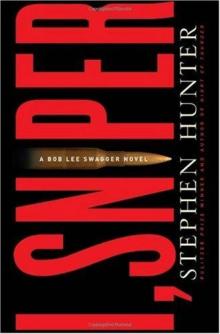 I, Sniper
I, Sniper Havana
Havana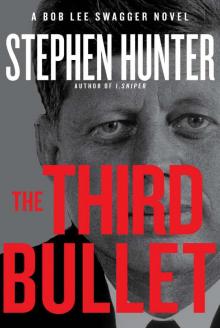 The Third Bullet
The Third Bullet Sniper's Honor: A Bob Lee Swagger Novel
Sniper's Honor: A Bob Lee Swagger Novel Dirty White Boys
Dirty White Boys The 47th Samurai
The 47th Samurai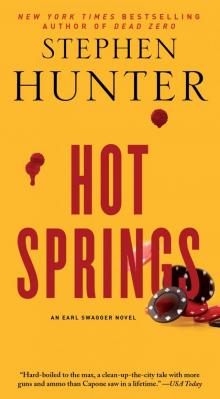 Hot Springs
Hot Springs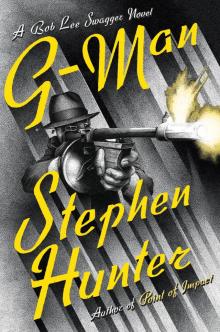 G-Man
G-Man Black Light
Black Light Time to Hunt
Time to Hunt The Day Before Midnight
The Day Before Midnight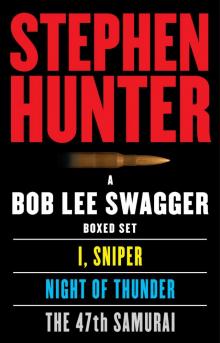 A Bob Lee Swagger Boxed Set
A Bob Lee Swagger Boxed Set The Master Sniper
The Master Sniper Game of Snipers
Game of Snipers Tapestry of Spies
Tapestry of Spies Citadel
Citadel The Second Saladin
The Second Saladin Stephen Longacre's Greatest Match
Stephen Longacre's Greatest Match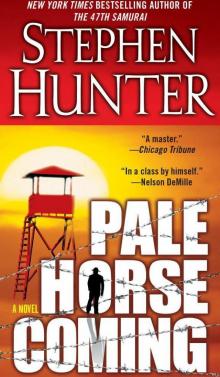 Pale Horse Coming
Pale Horse Coming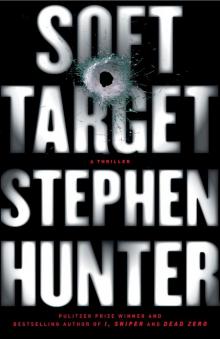 Soft Target
Soft Target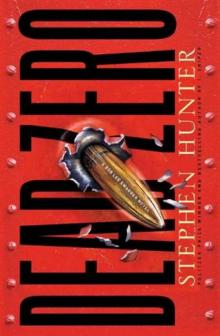 Dead Zero
Dead Zero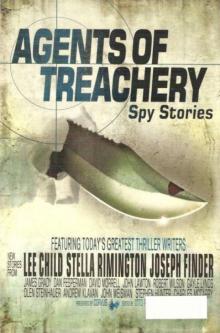 Casey at the Bat
Casey at the Bat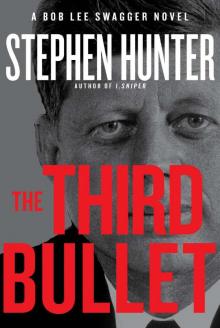 The Third Bullet bls-8
The Third Bullet bls-8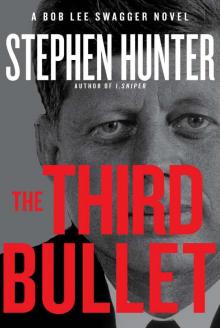 The Third Bullet: A Bob Lee Swagger Novel
The Third Bullet: A Bob Lee Swagger Novel Sniper's Honor
Sniper's Honor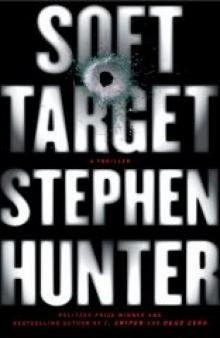 Soft target rc-1
Soft target rc-1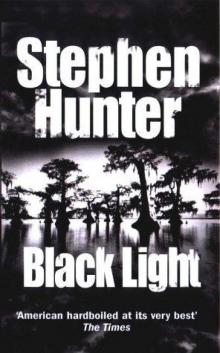 Black Light bls-2
Black Light bls-2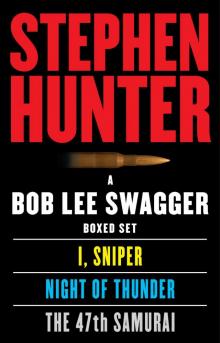 A Bob Lee Swagger eBook Boxed Set: I, Sniper, Night of Thunder, 47th Samurai
A Bob Lee Swagger eBook Boxed Set: I, Sniper, Night of Thunder, 47th Samurai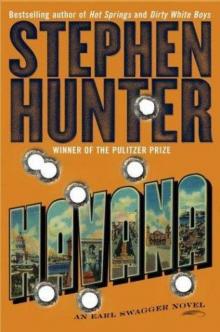 Havana es-3
Havana es-3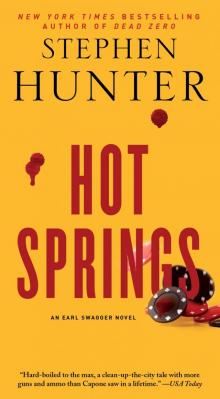 Hot Springs (Earl Swagger)
Hot Springs (Earl Swagger)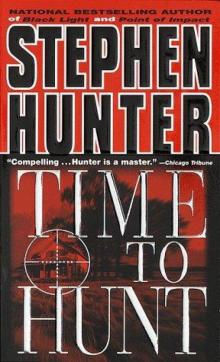 Time to Hunt bls-1
Time to Hunt bls-1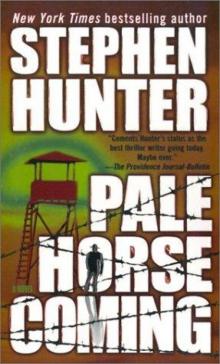 Pale Horse Coming es-2
Pale Horse Coming es-2 Hot Springs es-1
Hot Springs es-1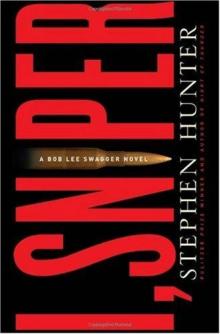 I, Sniper: A Bob Lee Swagger Novel
I, Sniper: A Bob Lee Swagger Novel